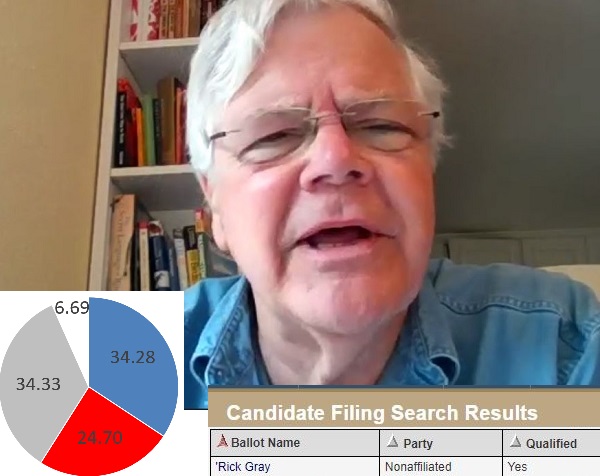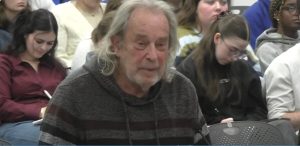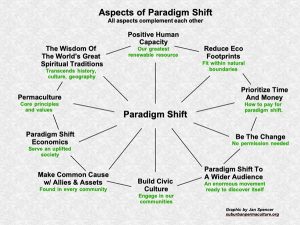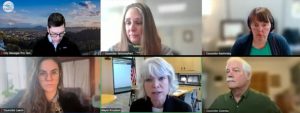District 32 candidate Rick Gray is first nonaffiliated candidate to qualify
7 min read
From Cannon Beach and running for the Oregon House as a nonaffiliated candidate, the former secretary of the commonwealth of Virginia, Rick Gray.
[00:00:08] Rick Gray: Hello. My name is Rick Gray. I live in Cannon Beach. I’m running for the 32nd District House seat. I am running as a nonaffiliated candidate on purpose. I’ve been around politics my whole life, and I’m pretty much fed up with the two major parties.
[00:00:22] The first thing I remember hearing was, ‘In Oregon, only seven counties matter in Democratic politics.’ And I looked up the numbers and the charts and graphs for elections. And I realized quickly, yeah, those seven counties are the upper I-5 corridor, or the Lower Willamette valley, basically that’s where all the power is, and the rest of the state doesn’t get listened to very much.
[00:00:45] And that’s what kind of began to get me thinking about Oregon politics in general, and the fact that this is a state that is essentially run by the urban corridor and the rest of the state doesn’t get heard. And I think that has caused any number of problems and something that I’m serious about addressing.
[00:01:02] John Q: He characterized himself as a practical, working politician.
[00:01:07] Rick Gray: I have been involved in practical politics on and off my entire life. I grew up in Virginia. My dad was a state legislator for 18 years, Democrat. I went to college and law school. And then when I got out of law school, I went to work with him and helped him with his legislative work, a great deal that I didn’t get paid for that, but I was in the next office, and he was my boss.
[00:01:30] So when he came into the office and said, ‘Would you mind putting aside whatever you’re working on for a minute and help me with this bill?’ I would help him with that bill. I learned a good deal from doing that.
[00:01:40] After about three years, I came in and said, ‘Dad, I know you’re a Democrat and you’ve always been a Democrat. You always will be a Democrat, but I feel like I’d be better off as a Republican.’
[00:01:49] Now in those days, this was late 1970s, you could be a fairly progressive Republican. My idea of a Republican was Teddy Roosevelt. Somebody who cared a great deal about the planet and cared a great deal about taking care of people, but was an outspoken, tough kind of guy. And so he said, ‘You do what you need to do.’
[00:02:06] I switched parties. I campaigned for the moderate Republican who was running for governor of Virginia that year, John Dalton, and the next year John Dalton named me secretary of the commonwealth, which is what Virginia calls secretary of state.
[00:02:20] John Q: He recalled attending meetings of the national association. Rick Gray.
[00:02:25] Rick Gray: The National Association of Secretaries of State, I always enjoyed their meetings. Those were great meetings. I met a lot of interesting people. One of the people I met actually was Joe Manchin’s daddy, who was then secretary of state of West Virginia, and a tougher guy you’d very seldom meet. He and the secretary of state of Montana almost got in a fistfight at one of our conventions, which was very interesting.
[00:02:46] John Q: After a lifetime in politics, he shared some advice for young Democrats.
[00:02:54] Rick Gray: I’ve been around the Democratic Party my whole life. Sometimes I’ve been in it, sometimes I’ve been observing it from the outside, but the Democratic Party has a terrible tendency to attract young people who think they’re going to change the party. And then when they get into it, the party changes them. The Democratic Party is very good at co-opting people.
[00:03:14] It has always been a top-down organization internally. It has never been democratic. It’s always been kind of ruthless. And I just feel like, you know, if a guy in his 20s goes to Salem and joins the Democratic caucus, he is going to be told what all young members of parties are told: ‘Keep your mouth shut. Stand in line. Wait your turn. After a couple of terms, we’ll get you a nice committee assignment, and then you’ll start to make a difference.’
[00:03:40] The problem with this state is that the Democrats run the state. And it’s basically the Portland Democrats who run the state and they don’t hear from anybody else. They don’t know the rest of the state. They don’t know the east. They don’t know the south, they don’t know the coast and they don’t know the problems there. And the solutions that they come up with for things are urban solutions, which often don’t fit the rest of the state.
[00:04:03] John Q: He was asked why he is not affiliated with any political party. Why not run with a third party? Rick Gray.
[00:04:10] Rick Gray: Third parties. I taught history for a lot of years. I’ve studied history since I was 18 and what I learned from history is this: It is difficult to have a third party in this country.
[00:04:22] There has only been one successful third party in this country. And it was founded in 1854. It was called originally the Fusion Party or the Anti-Nebraska Party, but very quickly adopted the name Republican Party. The Republicans were founded at a time when the two major parties, the Whigs and the Democrats, were gridlocked.
[00:04:43] It was a huge moral question that the country had to address: Slavery. And it wasn’t addressing that question. And there was a huge economic need to transform the economy from an economy that essentially exported products to Europe to be manufactured and to turn our own economy into an industrial economy. To do that would’ve required basically an end to slavery because slavery was entirely engaged in producing raw materials. So there was a moral issue and an economic issue that were closely connected, but they weren’t getting addressed.
[00:05:16] In 1854, Congress basically opened all the Western territories to slavery and there were Democrats and Whigs who were so offended by that, horrified by that, that they quit their respective parties and embraced people whom they had been hating for decades. Democrats embraced Whigs, and these were practical politicians, governors, senators, congressmen, political organizers—people who’d been playing politics for years in the real world who embraced each other and started something new.
[00:05:46] In 1854, that started. By 1861, seven years later, that new third party had Abraham Lincoln in the White House, had a majority in the House of Representatives, had a majority in the U.S. Senate, which is the evidence that there is a way in this country to create a third party that works.
[00:06:07] But the thing that’s interesting is it was created at the state and local level by practical politicians who actually understood how politics works. It was created as a moral response to an outrage and as a determined effort to do something about that outrage.
[00:06:27] John Q: Is there any one issue that might launch a third party today?
[00:06:31] Rick Gray: I think there is one issue and absolutely only one issue in this time that will justify the creation of third party in terms of a third party that could actually win. And I didn’t get into this election not to win. I’m better qualified than either of my fellow candidates and I could win this election. But it’s not about me. I’m 71. I’m not going to have a great, brilliant political career. I want to prove that it can be done so that younger people will start doing what needs to be done.
[00:07:01] The only issue that you could build a third party around that will actually work is climate, because it’s an emergency, because it’s a crisis, and because it’s an enormous moral issue. We need to leave a livable planet to our children and grandchildren. If we do that, if we make that the center of a party and otherwise have a big tent…
[00:07:23] I’m fairly centrist on most issues. The issue that I am very ‘progressive’ about is climate. And the reason I use the word ‘progressive’ in quotes there is because I don’t think climate is a left/right issue. I don’t think it should be a left/right issue. Climate is a survival issue. We should all be in this thing.
[00:07:43] So I think a third party would work, but it’s got to be a coming together of people who have done politics, understand politics, and are willing to embrace each other and build something new that works and it’s designed to win.
[00:07:56] John Q: A road map for a winning third party, from the former history teacher and secretary of the commonwealth of Virginia. For now he is an unaffiliated candidate seeking the support of unaffiliated voters.
[00:08:08] Earlier this year, the number of Oregon voters not affiliated with any political party edged past registered Democrats for the first time. At 34.33% as of July, nonaffiliated voters are about 10 points above registered Republicans.




